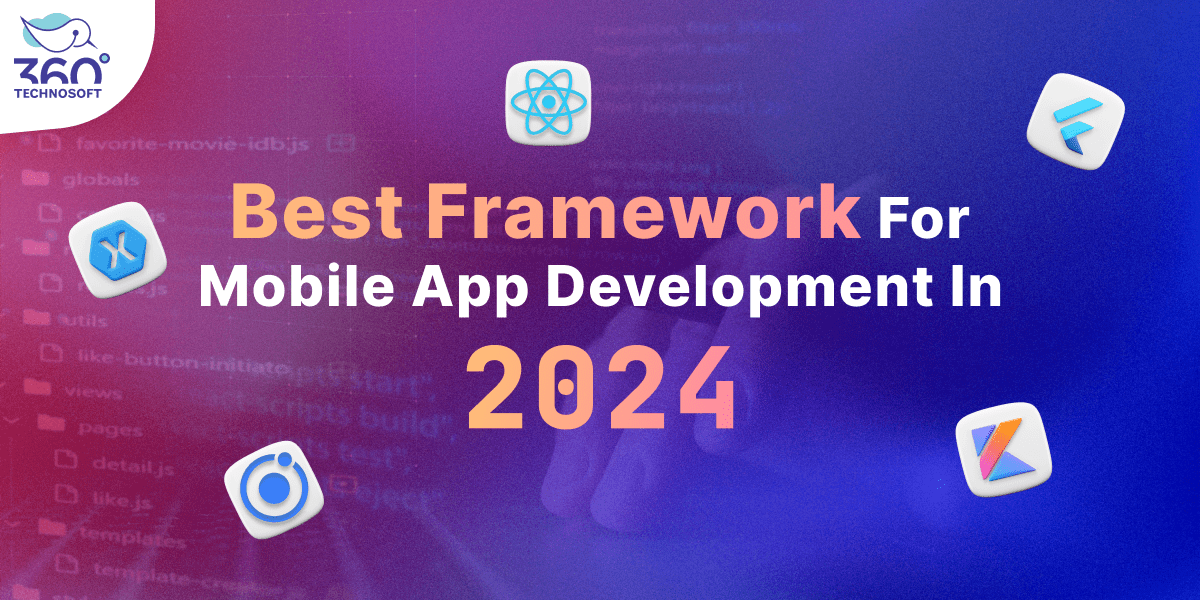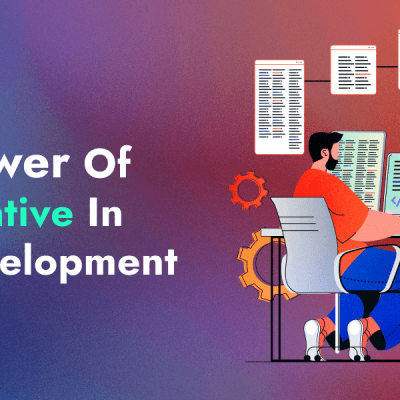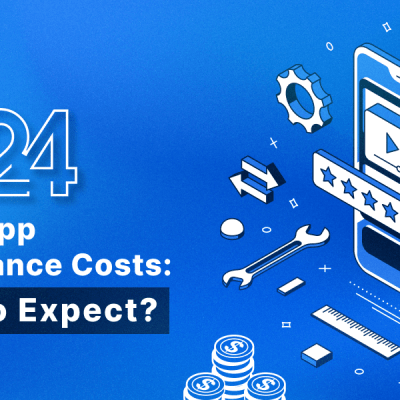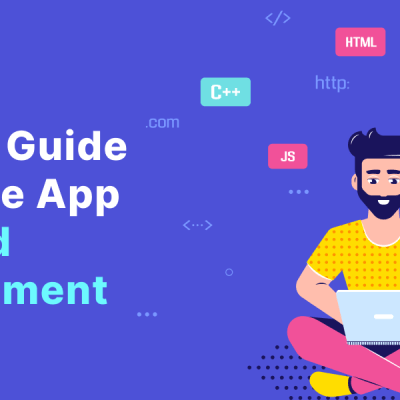Introduction
The competition grows intense daily and the incompetent ones rarely live to fight another day.
This statement is true for not only our world but also the world of technology. Staying ahead of your competitors has become a crucial factor, especially in mobile app development.
Small-scale startups usually struggle to survive in the mobile app market. This is either due to unorganized team efforts or ineffective leadership.
One of the facets of your app’s success is its app development framework; picking the right one can be overwhelming.
However, with a clear vision and robust leadership, it can be your greatest weapon to gain an edge against your competitors.
This article will offer you the best insights and explanations about the most trending and popular mobile app frameworks in 2024 that can suit your business requirements.
We assure you that picking the one right for your business will be easier once you are done with this article. So stay tuned with us until the end while we wait for you on the other side.
Mobile App Development Framework Statistics
Before we get to the nitty-gritty of the different frameworks, it wouldn’t hurt to explore a few statistics about those frameworks.
After all, numbers and data are something that our minds can trust.
- Statista states that this year will surpass $53 billion worldwide in global app spending. It also states that by 2027, this revenue will touch US $673.80 billion. Seriously, that is a lot.
- It further adds that in 2022, 46% of the developers used Flutter for developing mobile apps. Roughly one-third of the developers around the world use cross-platform frameworks while the rest utilize native tools.
- According to Google, 53% of mobile website visitors leave the webpage if it doesn’t load in under 3 seconds. This calls for the optimization of your app or website to retain traffic.
- Stack Overflow Survey 2023 states that 9.12% of developers around the world love working with Flutter for mobile app development. A massive reason for that is its extensive community support and available resources.
You see how extensively important mobile app development frameworks have become. This is just a modicum of the capabilities of app development frameworks in the mobile app market.
Since it is evident that frameworks have a lot of skin in the game of mobile app development, how impactful can they be to a business strategy?
Importance of Mobile App Development Frameworks
The right framework can make or break the success of your mobile app. There have been many instances of this on both sides of the spectrum. The right one generates immaculate traffic for the app and the wrong one diminishes it.
This is why it is difficult to pick the right framework. However, it could make all our lives easier if we knew what criteria to look for in a framework before deciding on one.
The criteria are as follows:
Easy-To-Use
This was a no-brainer. Any highly proclaimed framework in the world should pass the bare minimum criteria of offering convenience to the developer.
No one wants to learn the additional features of software to use it for development when they already have a lot going on in their app development phase.
This is why a framework must be simple and convenient enough to understand.
Performance
A slow and laggy framework does not increase anything except the bounce rate of its developers..
Faulty performance in a framework can do nothing but squander time and resources. So make sure to pick one that is highly optimized and offers split-second results to the user.
This would not just aid in delivering the project on time and make a case for a seamless developer experience.
Cross-Platform Compatibility
A viable strategy these days is to release your mobile app on every platform to garner a wide audience. This is where cross-platform app development steps in.
Not always the case, however, most of the time, developers tend to build cross-platform apps to release them on both Android and iOS.
So make sure to pick the framework that endorses cross-platform development and invite the audience from multiple platforms.
Community
Similar to how being active and consistent in social media results in higher user engagement and traffic, the more active a community is in a framework, the more frequently it gets updated.
Picking a mainstream framework with a large community helps in receiving instant support which helps you to tackle issues quicker and more effectively.
Engaging UI/UX
A massive factor for mobile app success is its user interface.
A visually enticing UI/UX is assured to harbor a large customer base due to its interactive user experience and easy-to-use interface.
This makes things simpler for your audience and developers have a pleasant time working on the framework. So make sure to pick one with an appealing design.
Best Mobile App Frameworks in 2024
Flutter
By far the Michael Jordan of all frameworks, Flutter has been at the top of its game for the past two years.
A study shows that more than 2 million developers around the world prefer to work with Flutter and its ease of use. It outranked React Native in 2021 to become the world’s most beloved app framework for building mobile apps.
Just like a cool kid on the block, it seamlessly fluctuates between Android and iOS offering apps that can function on both these platforms.
There are many reasons why Flutter does so well in the developers’ community. Let’s understand them:
Flutter’s best feature is…
Its hot reload feature can save the developer a lot of time by showing real-time changes impacting the app, eliminating the need to reboot the entire app and start from scratch.
The conservation of both time and effort takes place through this highlighting feature of Flutter. Some other features of Flutter include:
- Easy-to-learn interface- This allows Flutter to develop mobile apps without using OEM widgets or a lot of code which simplifies the process.
- Performance- Developers get confused a lot separating a Flutter app from a native app which is a testament to Flutter and its functionalities.
- Low Cost- Due to its cross-platform capabilities, Flutter saves a lot of time and cost for developers creating apps for both iOS and Android.
React Native
The next in line after Flutter is React Native. This framework relies on JavaScript and bridges the gap between iOS and Android.
It is known for its versatility and speed in producing and delivering executable commands and functions.
It was created by Facebook in 2015 as an open-source mobile app development framework. It utilizes JavaScript to develop cross-platform mobile apps with native capabilities.
By far the best feature of React Native is…
Its code reusability allows developers to build different apps for multiple platforms using the same code. This eliminates the hassle of building an app from scratch for another platform.
Some of its other features include:
- Native Outlook- The components of this framework function exactly like the platform’s native components. Since the components look and feel similar to Android and iOS, the app looks and feels the same across both these platforms.
- Cost-Efficient- Due to code reusability there is a lot of time and money that funnels in the right direction. This feature helps in managing both money and time effectively.
- Third-Party Plugins- Due to the high-cost expenses required to build a mobile app, React Native provides a lot of third-party plugins with native and JavaScript-based modules. This helps in reducing the cost of development.
Swiftic
Unlike the ones above, this one does not require any programming language to build apps on it. It focuses on the world of iOS app development.
Primarily for small businesses, anyone in the world is capable of using this app builder. This is due to its drag-and-drop functionality that helps in adding components and templates suitable according to your app requirements.
The best feature about Swiftic mobile app builder is…
Its simple and easy-to-use, drag-and-drop feature allows you to create the app of your dreams. Yes, with no prior coding experience, you can still build your app on your terms.
Some of its other features include:
- Customizable Templates- There is a plethora of templates in its candy store that you can use for free (unlike candy in the store) and customize it based on your creativity and requirements.
- Push Notifications- Businesses can send updates and changes through this feature informing their users about them which also builds user engagement.
- Analytics Integration- Fast-paced and informed decision-making is possible as users can monitor their app’s performance and user engagement metrics.
Ionic
This is another open-source framework to make things easier for all developers around the world. It focuses on the UI design of the app and can build high-quality cross-platform apps from a single code base.
Some of the frameworks it works with are Vue, Angular, and React.
The best feature of Ionic app development is…
Its platform-independent framework allows you to build cross-platform apps for both iOS and Android. We understand that this might be the same as the other but trust us, there’s more.
Released in 2013, Ionic has quickly climbed the ranks of the best frameworks to work on in the world of mobile app development.
A survey done by Ionic states that in 2021, 5 million apps were developed using their framework and 72% of the developers built PWAs using Ionic.
Other additional features include:
- Open-Source- The open-source nature of Ionic allows developers to show carte blanche skills for their mobile app requirements.
- Simpler Testing- This framework also facilitates app testing on mobile browsers. It makes things simpler for developers to test apps on mobile devices like iOS and Android as it utilizes Cordova commands.
- Widget Development- It also allows developers to build shortcut widgets for the most used apps on the home screen saving users a lot of clicks on their devices.
Xamarin
Last on our list arrives in style as it has a treasure of tools to offer for developing cross-platform apps.
Although a wounded warrior on the battlefield of frameworks, Xamarin still has a lot to offer to the world of apps. It might not be the talk of the town anymore, but it still does miles better than most of the frameworks from the world.
The best feature of Xamarin is…
It has different compilation strategies for app development. It has Xamarin. iOS for developing apps and Xamarin.Android for building Android apps.
The best part about this is that 80% of the code can be written and reused in C#. Some additional features of Xamarin include:
- Object-Oriented Language- This implies the simplicity in its syntax and how easily the developer can utilize headers and pointers in their code.
- Functional on Smart Devices- This framework can also be used in smart devices like wearable tech. Visual Studio helps in building apps for Windows, Mac, and smartwatches.
- Native Functionality- Since businesses thrive due to the degree of their app’s nativeness, Xamarin highly offers that. Developing cross-apps gives access to specific features and reduces the life cycle of its development.
Conclusion
Keeping yourself updated with the latest frameworks that are trendy in the mobile app market is not such a bad thing to do.
It can help in making informed decisions about the kind of product that you require from the developer.
You and your app can benefit a lot from the data and insights above.
Make sure that you do your research and figure out which of these frameworks will suit the best for the requirements of your app. Getting carried away by the shiniest light is not always the correct decision to make or in this case, the best framework.
After all, you get to decide the terms on which your app will be built, not the world.
Frequently Asked Question’s (FAQ’s)
1. How to choose the right mobile app framework for your project?
Many factors at work can help you pick the right app development framework for your mobile app:
- Developer’s expertise
- Community Support
- Project Requirements
- Performance
- Scalability
2. Which framework is recommended for enterprise-level applications?
Enterprise-level apps require scalability, integration, and high performance. Such criteria fit Xamarin due to its Microsoft support and robust features for large-scale development.
3. Which framework is best for startups and small development teams?
Frameworks like Ionic and React Native are preferred for their simple and easy-to-use, adaptable, and large community support for small-scale startups.
4. How to find additional resources and support for these frameworks?
Developers can find support and documentation for these frameworks through their official websites, GitHub repositories, developer communities, and community forums.






